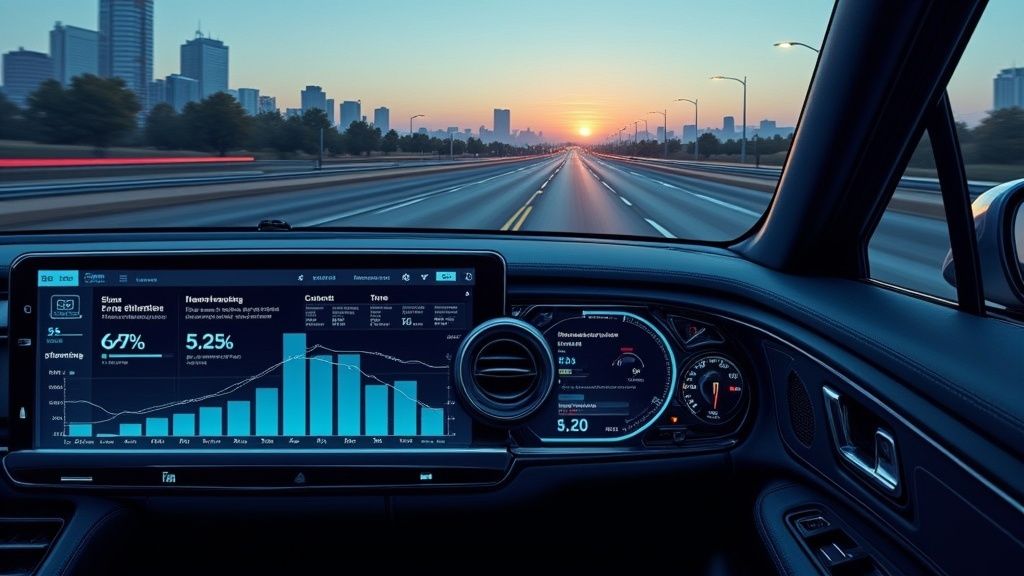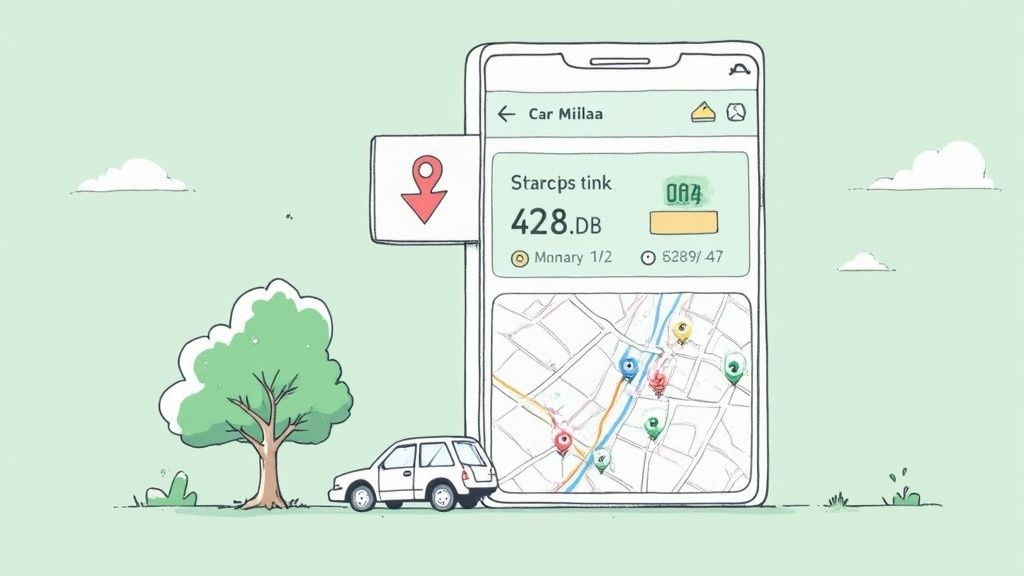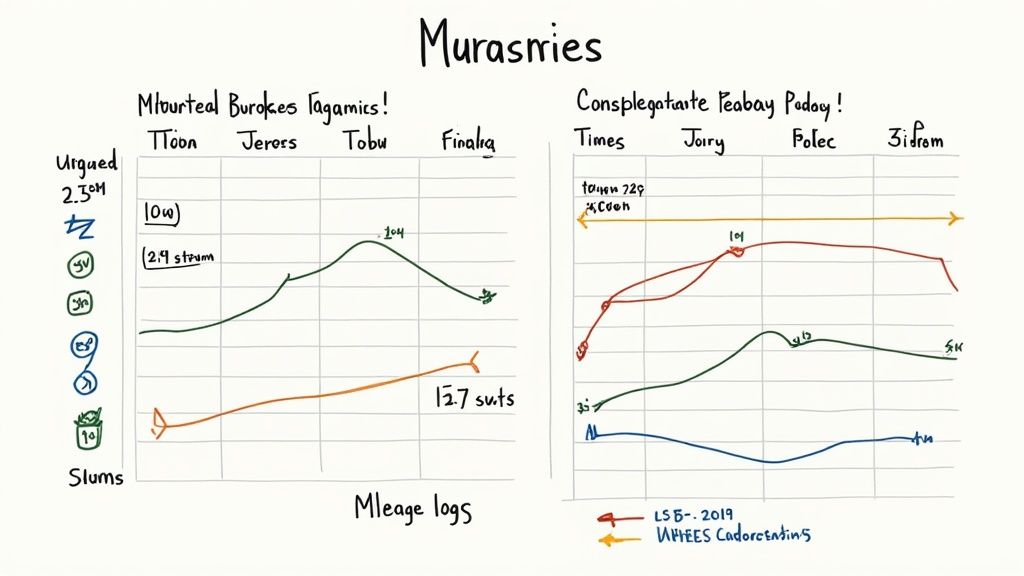
Best Mileage Tracker for Car: Your Complete Guide to Maximizing Business Travel ROI
Understanding Mileage Tracking Technology That Actually Works

Proper mileage tracking helps businesses maximize tax deductions and control vehicle costs. But not every tracking app delivers reliable results. Let’s examine what makes mileage tracking technology work effectively and what factors affect its performance.
How GPS and Cellular Data Work Together
Modern mileage trackers combine GPS satellites with cellular networks to monitor vehicle movement. The GPS provides precise location data while cellular networks transmit this information to your phone or cloud storage. For best results, you need good signal coverage - weak spots can lead to gaps in tracking. The system works seamlessly when both components function properly.
The Importance of Accurate Tracking Algorithms
Good tracking apps do more than collect raw location points. They use smart algorithms to:
- Filter out incorrect data
- Fix GPS glitches and errors
- Identify business vs personal trips
- Calculate precise mileage totals
These processing steps turn basic location data into useful business records.
Battery Drain and Data Usage: Addressing Common Concerns
Many users worry about battery life and data consumption. Testing shows major differences between apps. For example, MileIQ used significant resources but only logged 103.6 miles out of 129 actual miles. In contrast, QuickBooks Self-Employed proved more efficient, using just 2.73 MB of data and 0.04% battery per hour while maintaining accuracy. Picking an optimized app helps avoid these common issues.
Manual Tracking as a Backup Option
While automatic tracking offers convenience, keeping a basic manual log provides helpful backup. This proves useful when:
- GPS signals are weak
- Cell coverage is spotty
- Technical glitches occur
- You need to verify automated records
Using both methods ensures you capture all business miles and can support tax deduction claims with complete documentation.
Maximizing Tax Deductions Through Precise Tracking

Getting the most from your tax deductions requires careful mileage tracking. This involves more than just monitoring your miles - it’s about properly documenting every business trip to meet IRS requirements while maximizing your eligible deductions. Using an effective mileage tracking system helps simplify this process and improve your overall financial records.
Why Accurate Tracking Matters
The IRS needs detailed records to support business mileage deductions. You must log each business trip’s date, destination, purpose, and total miles driven. Small gaps in tracking can significantly reduce your deductions. Research shows that basic tracking apps often miss approximately 7% of actual miles driven, which can mean losing around $500 in yearly deductions. Learn more at Mileage Ace.
IRS-Compliant Record Keeping
To protect your deductions during an audit, you need proper documentation. A good mileage tracking system should offer:
- Automatic Tracking: Records trips without manual input to reduce errors
- Trip Categorization: Clear labeling of business vs personal trips
- Detailed Reports: Complete documentation with all tax filing requirements
Common Tracking Mistakes and How to Avoid Them
Watch out for these typical errors that can reduce your deductions:
- Inconsistent Tracking: Skipping short trips or occasional business drives
- Poor Documentation: Not recording key details about trip purposes
- Faulty Apps: Using unreliable tracking tools that miss mileage
- No Backup System: Failing to keep manual records as a backup
Prevent these issues by using reliable tracking tools and maintaining consistent recording habits. This approach helps secure your deductions and provides documentation if questions arise.
Choosing the Right Mileage Tracker for Car
Pick a tracking system that fits your needs by evaluating:
- Accuracy: Look for proven GPS tracking reliability
- Ease of Use: Make sure the interface makes logging and reporting simple
- Features: Check for automatic tracking and trip sorting capabilities
- Integration: Consider how it works with your other financial tools
Using an effective mileage tracking system and following proper documentation practices helps convert your vehicle expenses into valuable tax deductions. The right tracking tool serves as a smart investment that improves both your deductions and financial record-keeping.
Advanced Features for Complete Vehicle Management

A mileage tracker offers much more than basic mileage logging - it’s an essential tool for managing your vehicle effectively. Successfully overseeing a single vehicle or entire fleet requires tracking multiple aspects beyond just mileage. Modern tracking solutions provide advanced features that help optimize operations and deliver key business insights.
Smart Maintenance Scheduling
One major benefit of advanced trackers is predictive maintenance scheduling. These tools monitor mileage and service history to forecast when your vehicle needs routine maintenance like oil changes and tire rotations. This helps prevent costly breakdowns and extends vehicle life. Setting up automated service reminders ensures you stay on top of critical maintenance tasks.
Real-Time Fuel Management
For both individual car owners and businesses, fuel costs make up a significant expense. Modern mileage trackers provide instant fuel efficiency data, helping identify driving behaviors and mechanical issues that waste gas. This allows you to adjust driving habits and fix problems quickly to reduce fuel costs. Many trackers can even point you to the lowest gas prices along your routes.
Complete Vehicle Management Integration
The best mileage tracking tools work smoothly with other vehicle management systems. This creates an all-in-one solution that makes operations simpler and gives a full view of vehicle performance. Tools like Motolog include features for tracking mileage by state, monitoring expenses, calculating fuel economy, and managing service records. The app also offers data import/export and multi-user access. Having everything in one place makes record-keeping easier and enables data-based decisions.
Benefits for Businesses of All Sizes
Advanced mileage tracking provides major advantages whether you have one vehicle or many. Small businesses can use these tools to track costs, maximize tax write-offs, and stay on top of maintenance. As companies grow, the systems easily scale up to handle larger fleets while providing insights into performance and driver behavior. The data helps optimize routes, lower fuel usage, and schedule maintenance across all vehicles. These advanced capabilities help businesses boost efficiency and cut costs, regardless of fleet size.
Automatic vs. Manual Tracking: Making the Right Choice

When you want to track your car expenses and tax deductions, one of the first decisions you’ll face is whether to track mileage automatically or manually. Each method has clear benefits and limitations that impact how effectively you can monitor your business travel.
Automatic Mileage Tracking: Hands-Off Recording
Modern automatic mileage trackers use your phone’s GPS to record trips while you drive. The apps work silently in the background, eliminating the need to write down odometer readings. Many also include smart features like sorting business and personal trips or creating tax-ready reports. This seamless approach works well for drivers who want minimal effort in their record keeping.
Key benefits of automatic tracking:
- Better Precision: Removes human error from data entry
- Major Time Saver: No manual logging required after trips
- Professional Reports: Creates organized mileage summaries automatically
But automatic tracking comes with some trade-offs:
- Battery Impact: GPS tracking uses phone power
- Data Usage: Requires cell data for real-time updates
- Privacy: Some users prefer not sharing location data
Manual Mileage Tracking: Direct Record Keeping
With manual tracking, you record trip details in a notebook or spreadsheet. While it takes more effort, this hands-on method gives you complete control over your records. It works well for occasional business drivers or those who want to minimize technology use. The simple approach of pen and paper appeals to many who prefer basic record keeping.
Benefits of the manual approach:
- No Apps Required: Just need basic writing tools
- Complete Oversight: You manage all data directly
- Total Privacy: No location tracking involved
Common challenges with manual logs:
- Time Required: Must record each trip individually
- Possible Mistakes: Risk of recording errors
- Extra Work: Demands consistent attention to detail
Choosing Your Best Option
The ideal tracking method matches your specific needs. Automatic tracking makes sense for frequent business driving where convenience matters most. Manual logs work better for occasional trips when simplicity is the priority. Tools like MyCarTracks offer automatic features like trip detection and expense reports if you want technology to handle the work. Consider your driving patterns and comfort with digital tools when deciding. Pick the method that helps you maintain accurate records while staying focused on your business.
Selecting Your Ideal Tracking Solution
Finding the right mileage tracker requires careful consideration of your specific needs and the features offered by different options. Taking time to evaluate the core capabilities and functionality will help you choose a solution that works best for your situation.
Key Features to Consider
When reviewing mileage tracking options, several essential features can make a big difference in day-to-day use:
- Automatic Trip Detection: GPS-based automatic tracking eliminates manual data entry, saving time and improving accuracy by recording trips automatically
- Trip Classification: Easy business vs personal trip categorization is essential for tax purposes and accurate deduction claims
- Report Generation: Detailed IRS-compliant reports with trip dates, times, destinations and purposes are crucial for documentation
- Software Integration: Connection with accounting and expense tools helps maintain organized records efficiently
Comparing Different Tracking Methods
There are two main types of mileage trackers: smartphone apps and dedicated GPS devices. Apps like Auto Service Logger use your phone’s built-in GPS for convenient tracking. Dedicated devices cost more but offer enhanced accuracy and extra features.
| Feature | Smartphone Apps | Dedicated GPS Devices |
|---|---|---|
| Cost | Lower cost, free/freemium options available | Higher upfront cost plus possible subscriptions |
| Convenience | Uses existing smartphone | Requires separate device setup |
| Accuracy | Good with phone GPS | Very high with specialized hardware |
| Extra Features | Expense tracking, reporting tools | Fleet tracking, theft prevention |
Evaluating User Experience and Support
The interface and available help resources significantly impact your satisfaction with a mileage tracker. Look for simple, intuitive controls and reliable customer service when you need assistance. Products like Auto Service Logger include lifetime membership options with ongoing support and updates.
Considering Your Specific Needs
Your ideal tracker depends on your usage patterns and requirements. Occasional business drivers may only need a basic app, while frequent travelers benefit from advanced reporting and features. Important factors include:
- Number of vehicles tracked
- Multi-user support needs
- Tax documentation requirements
- Data security and privacy
- Available budget
Take time to assess these elements to find a mileage tracking solution that aligns with your needs and makes vehicle management easier.
Implementation Strategies That Drive Success
A mileage tracker is more than just a tool - it’s a way to improve your business operations and results when used effectively. Success comes from smart planning, proper training, and ongoing management. Here’s how leading companies turn mileage tracking into a valuable business asset.
Building a Sustainable Tracking Practice
Start by clearly defining your business needs. Consider who will use the mileage tracker, what kinds of trips they take, and how you’ll use the data. For example, your sales team likely has different tracking needs than your service technicians. This initial evaluation helps you pick the right solution and create solid processes.
Practical Approaches to User Training
Good training leads to consistent usage and accurate records. Provide clear guidance on using the mileage tracker effectively, including best practices for:
- Starting and stopping trip tracking
- Separating business and personal miles
- Adding important trip details
Make sure to offer ongoing support and quickly address questions. When users understand the system, you get more reliable data.
Compliance Management and Workflow Optimization
Connect your mileage tracker to your existing systems like expense reporting software. Create clear processes for reviewing and approving mileage logs. This reduces manual work and ensures you capture all mileage data properly for tax and reimbursement purposes.
Overcoming Implementation Challenges and Monitoring Systems
Plan ahead for common issues like users forgetting to track trips or having privacy concerns. Address these proactively with reminders and clear policies. Set up regular reviews of mileage data quality and watch for unusual patterns. Quick problem-solving helps maintain user adoption.
Generating Insights That Drive Business Decisions
A well-run mileage tracking system provides valuable business data. By analyzing trip patterns, you can find ways to:
- Optimize driving routes
- Lower fuel costs
- Improve overall efficiency
This data helps you make smarter choices that save money and give you an edge.
Ready to improve your mileage tracking and gain valuable insights? Start your free trial of Auto Service Logger today!